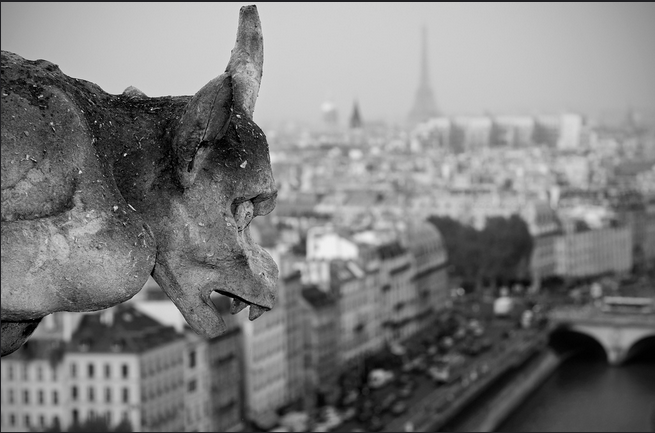Language: French
July Issue Highlight: “Excerpt” by Cia Rinne
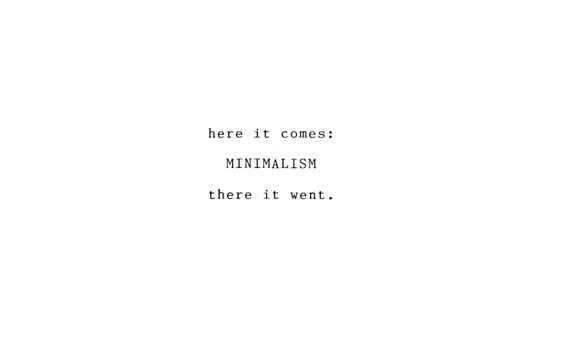
A look at one of our multilingual feature's star poems.
Translator’s Profile: Alyson Waters

Q&A with Alyson Waters, translator from the French and managing editor of Yale French Studies.
Alyson Waters’s translations from the French include works by Louis Aragon, René Belletto, Eric Chevillard, and Albert Cossery. She is the 2012 winner of the French-American Translation Award for her translation of Chevillard’s Prehistoric Times. Waters has received a National Endowment for the Arts Translation Fellowship, a PEN Translation Fund grant, and residency grants from the Centre National du Livre, the Villa Gillet, and the Banff International Literary Translation Centre. She teaches literary translation at New York University and Columbia University and is the managing editor of Yale French Studies. She lives in Brooklyn.
***
Asymptote: Describe your current/most recent project. Why is it cool? What should we know about it?
Alyson Waters: My current project is a translation of Jean Giono’s Un roi sans divertissement for New York Review Books. The title comes from one of Pascal’s Pensées: “A king without diversion is miserable; and therefore we see a great number of people constantly about the king whose sole task it is to amuse and avert the thought of the king from himself.” It’s an amazing book, a kind of existential mystery/roman noir. It has a very complicated structure, moving back and forth from the time of the telling of the story to the time of the events, and told in several narrative voices in an almost oral style. There’s a great passage in the book (among many) where the main narrator (or Giono?) inserts in the middle of his story the following:
“Obviously there exists a system of references comparable, for example, to the economic understanding of the world and in which Langlois’ blood and Bergues’ blood have the same value as the blood of Marie Chazottes, Ravanel, and Delphin-Jules. But there exists, encasing the first, another system of references in which Abraham and Isaac move logically, one following the other, toward Mount Moriah; in which the obsidian knives of the priests of Quetzalcoatl logically drive deep into selected hearts. And we are informed of this by beauty. One cannot live in a world where one believes that the exquisite elegance of the guinea fowl’s plumage is pointless. This is just an aside. I wanted to say it, and I did.” READ MORE…
What’s Foreign and Familiar: Part I

Writer Yuen Sin reflects on a childhood and adulthood spent finding herself between languages
“What is the Burmese word for cockroach (kar-chwa)?”
Auntie Moe Moe interrogated in a mixture of Mandarin and Hokkien dialect. My brother glanced at me haplessly as I rummaged through the repository of my memory, biting my lips as my live-in domestic helper, nanny, and aunt tapped her feet impatiently.
There it was. “Po heart.”
The romanization under my childish scrawl appeared in my head, and I triumphantly recited the two syllables hiding beneath my tongue. READ MORE…
Translation Tuesday: “Night Visit” by Emmanuel Bove

His eyes left the comforting flame of the lamp, seemed to follow the flight of a bird, then landed on me.
What was making me sad? My books—all my books—were sleeping on the shelves. No one had spoken badly of me. My family and friends had no particular worries. I found myself in the midst of all things. So I did not need to fear that events, in my absence, would take a turn I would be unable to change. I was not unhappy with myself. And, even had I been, this intensity of feeling was different.
It was eleven o’clock at night. A lamp without a shade lit my desk. I had not gone out all day. Whenever fresh air has not put color in my cheeks, I don’t feel at ease. My wrists are smoother and I notice, with some displeasure, that the down covering them is silkier, and when I go to bed, my unexpended energy makes me uncomfortable.
I was dozing in an armchair. At the seam where the red velvet meets the wood, golden tacks form a border. One of them was missing and, there, the edge sagged a bit. I sat motionless. My hand tugged at this seam without my being aware of it, as it sought unconsciously to pull out the next tack.
It was only once I had managed to pull it out that I became aware of what I was doing. I felt a small joy at this discovery, as I feel each time I catch myself doing something without realizing it, or when I bring to light a sensation in me of which I was unaware. It makes me as happy as a ray of sunshine or a kind word. Anyone who would criticize me for this tiny joy will never understand me. I think that seeking knowledge of oneself is a pure deed. To criticize me for digging too deep into myself would be to criticize me for being happy.
I have to say, though, that this joy is very fragile. It really is not equal to the joy a ray of sunshine gives us. Quickly it disappears, and I have to look for something else inside me to bring it back to life. Then, in the intervals, it seems that everything is hostile to me and that the people around me, with their simple joy, are in reality happier than I am.
*
I was reading when there was a knock at the door. It was my friend Paul. He rushed in and the door, which he had yanked behind him so it would close, stopped half-way.
“What’s the matter, Paul?”
“Nothing.”
His face was pale, and his eyes darker than usual. He dropped onto the sofa, which he knew was soft.
“But what is it?”
He stood, walked around the room as I put my book down, and lit a cigarette, then sat again. He was smoking the way nervous people do, his cigarette drooping from his mouth. From time to time, he would spit out bits of tobacco.
“Please, Paul, tell me what’s happened to you.”
I looked at him. I tried to find a gesture, an expression, something in his bearing that would reassure me. But there was nothing. If he had been holding some object, his fingers would have trembled. He must have realized this because he avoided touching anything whatsoever.
“Paul, I’m your friend. Tell me everything. You know if there’s anything I can do for you, I’ll do it. It hurts me to see you like this, without being able to help you.” READ MORE…
What’s a Tomme Cheese?
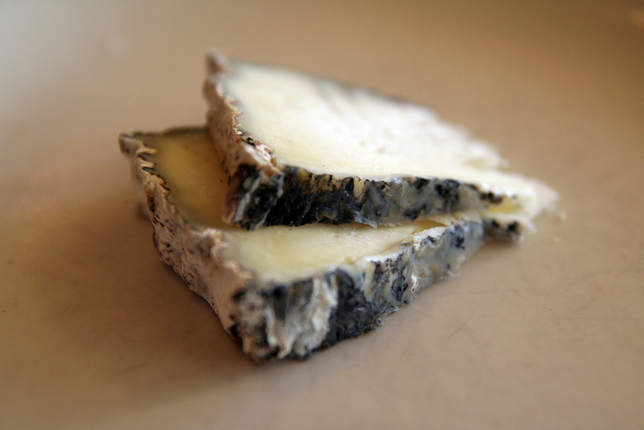
In her continued column about food & language, Nina Sparling examines just what—and how—"tomme" cheese has come to mean
Some words for foods are easily translatable. The word’s functional meaning shifts effortlessly between tongues. Tomato and pomodoro both indicate Solanum lycopersicum, member of the nightshade family. Poulet, pollo, and chicken look the same rubbed with oil and garlic roasting in a hot oven. In these cases, there is little room for deliberation: oil, butter, wine. Rice, wheat, corn. Their translations are patently accessible. Learning the words for foods in other languages is particularly satisfying. There’s immediate sensory recognition: the words indicate familiar tastes, smells, textures, and sights. The intimacy with what we eat follows. In learning to say tomato in another language, we begin to feel in it also.
But this question of feeling is where it gets finicky. While most anything carries a “literal” meaning in another language, its usage and implication remain awkward in translation. A New York bakery and a Parisian boulangerie operate in different ways. In both places flour is mixed with yeast and water, let to rise and baked. Yet we do not eat bread in the same ways, and the bread we eat is not the same.
Take, for example, the French word tomme. My first day of work at the cheese shop a colleague asked me what kind of cheese I liked. Tomme, I said. He was quick to call me out.
“Tomme is not a kind of cheese. Be more specific.” READ MORE…
THE SPIDERS
To Odette Bost
Into the houses where children die
Go some very old people.
They sit down in the antechamber
Their sticks between their black knees.
They listen, nod their heads.
Every time the child coughs
Their hands clutch their hearts
And make big yellow spiders
And the cough, rising through the furnishings,
Is shredded, listless as a pale butterfly.
They have vague smiles
And the child’s cough stops
And the big yellow spiders
Rest, shaking,
On the polished boxwood handles
Of the sticks, between their hard knees.
And then, when the child is dead
They get up, and go elsewhere…
In Review: “Self-Portrait in Green” by Marie NDiaye

Translated by Jordan Stump, and published by Two Lines Press
Let me talk about selfies.
Are you annoyed yet? I promise this isn’t a curmudgeonly thinkpiece about millennials; nor is it a listicle written by said millennials in defense of the selfie.* No, I’d like to talk about self-portraiture, which became conceivable as soon as mirrors and other reflective surfaces were available. (Narcissus may have enjoyed his reflection in antiquity, but he wasn’t real, and pools of water are never that smooth). The idea here is objectivity. A stable you that you can see.
Even without gadgetry (mirrors, glassy ponds, cameras et al)—I don’t think a selfie is a foray into solipsism. More the opposite: the way the self-it-self has been constructed is a result of the litany of selves surrounding it. We adjust to resemble, even when affirming our individual self-ness. Every selfie (can we say “self-portrait” now? I’m sorry!) exists as an algorithmic product of the selves around it, which, through refraction and contortion, inform whatever “self” is portrait-ed. This is true even sans Instagram.
This, at least, is my hypothesis after reading Two Lines Press’ 2014 publication, Self Portrait in Green, by French writer Marie NDiaye and meticulously translated by Jordan Stump. The slender novella is written in the first person against the stark relief of an ominous threat, one of a flood that is slated to destroy the village the narrator inhabits, by 2003. Through a series of recollections, Self Portrait in Green navigates a universe of threat, both environmental and interpersonal, through an interconnected series of engagements the narrator litanies against women afflicted by the color green. READ MORE…
Marcel Schwob’s “Mimes” – Mime XXI
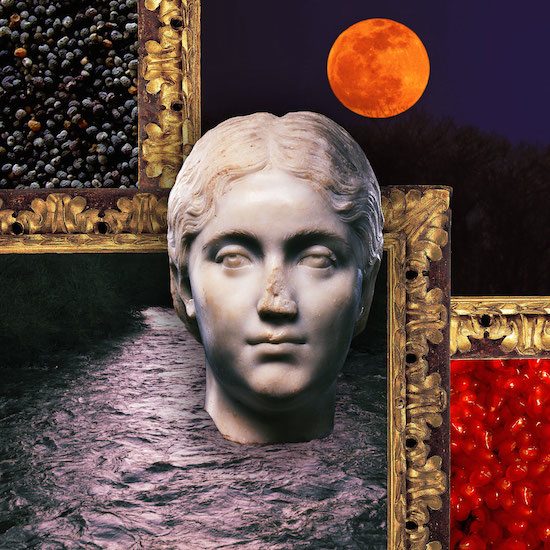
Book of Monelle translator Kit Schluter brings to English the haunting final installment of Marcel Schwob’s “Mimes”!
Read all previous posts in Asymptote’s “Mimes” translation project here.
Mime XXI. The awaited shade
The little guardian of the Temple of Persephone has laid out honey cakes sprinkled with poppy seeds in the baskets. For a long time now she has known that the goddess never so much as tastes them, for she watches from behind the pilasters. The Good Goddess remains unmoved and sups beneath the earth. And if she were to eat of our foods, she would rather bread rubbed with garlic and vinegar; for the bees of Hades produce a honey flavored of myrrh and the women who walk in the violet meadows there-below rattle black poppies without end. Thus the bread of the shades is dipped in honey that smells of embalmment and the seeds scattered upon it come with a desire for sleep. And thus why Homer said that the dead, governed by Odysseus’ broadsword, came by the ruck to drink the black blood of sheep in a square trench dug into the soil. And only this once did the dead partake of blood, in order to regain their life: customarily they repast on funereal honey and dark poppies, and the liquid that flows through their veins is the very water of the Lethe. The shades dine on sleep and drink of oblivion.
Au Marché, with Emile Zola

Nina Sparling finds Emile Zola's Les Halles in an NYC farmer's market. Part 3 in a series on food, literature, and translation
Runners zipped down the bike lane, out to beat the rising temperatures. We arrived at Skillman Avenue, just west of 43rd Street, a little after 7am. The sun was rising, the sky still lit with the glow reserved for early-risers and weekend revelers. It was opening weekend at the Greenmarket in Sunnyside, Queens. Ron parked the truck with a jolt and I almost spilled my coffee. The cider, oversized apple turnover, and apple farmers had not arrived yet. Patrick pulled up behind us, honking. He would unload crates of integrated pest management apples and tomatoes, challenging the expectations of seasonal produce. He works with Jesus and together they take home thousands, I’m sure. READ MORE…
Drinking with Boris Vian
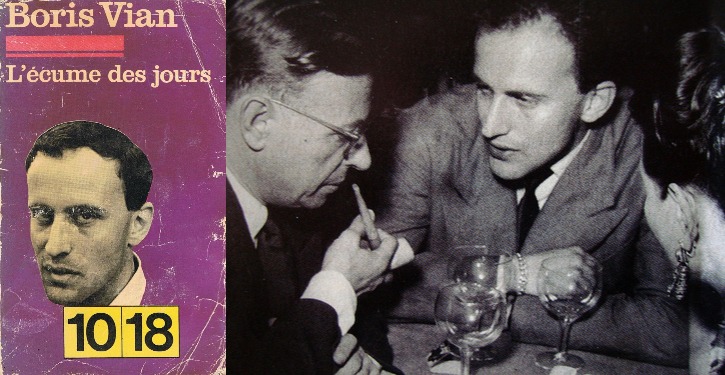
Part II in a series on food, literature, and translation—this time featuring Boris Vian and his classic "L'ecume des jours"
There is a way a room full of people drinking cocktails feels. It is distinct from the stale fog that spills from a fridge packed with six packs, and it is altogether different from the rosy-cheeked stupor induced by a case of wine. There is a severe and attentive atmosphere to the room. The alchemy of balancing sweetness, bitterness, and bite in a few ounces is mysterious and tempting. There is a self-awareness that comes with drinking an old fashioned, an edge to the precarious glass that a Manhattan arrives in. There is also enormous satisfaction in drinking a good one. The pleasure doesn’t last long—the drinks are always short and expensive. READ MORE…
Marcel Schwob’s “Mimes” – Mime XIX and Mime XX
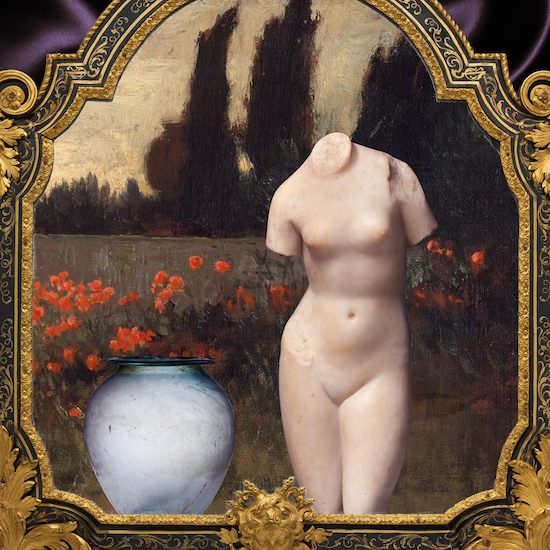
“Then I enfolded her in my arms—but clasped nothing besides the beguiling air.”
Read all previous posts in Asymptote’s “Mimes” translation project here.
Mime XIX. The mirror, the golden pin, the poppy
First to speak, the mirror:
I was shaped in silver by a skilful craftsman. At first I lay hollow like his hand and my other face looked like the ball of a wall-eye. But then I was given curvature enough to reflect images. Finally Athene breathed her wisdom into me. I am aware of the desires of the girl who holds me and already I tell her that she is pretty. Still at night she rises and lights her bronze lamp. She directs the gilded flight of the flame towards me, and her heart craves some other face than hers. I show her own white temple and her sculpted cheeks and the swelling tips of her breasts and her eyes full of curiosity. She almost touches me with her trembling lips—but the golden burning lights up her face alone; all else remains dark within me.
Colette’s Kicked Fish versus Pizza via Bushwick
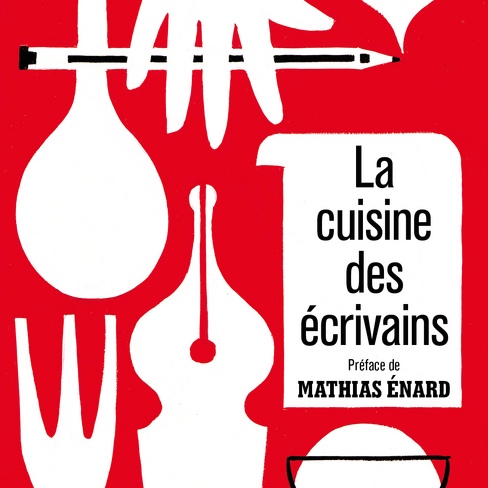
A new column by Nina Sparling on food and translation
It was January in New York and exceptionally cold. I took refuge in the kitchen and picked the complicated recipes, the ones that would prove that I could, that I had the patience and humility to follow the details of the book. I pulled the Roberta’s Cookbook off the shelf. Roberta’s opened in Bushwick, Brooklyn, in the winter of 2008. The restaurant is a couple hundred feet from the Morgan Avenue stop off the L train, one of the vital organs of the neighborhood. Industrial buildings turned post-grad housing with complicated zoning laws line the streets. From outside the restaurant it looks like a bunker. The cookbook was new to the collection, a gift I had given my mother. It lay horizontal atop my parents’ mass of weathered, yellowing, greasy cookbooks.
The cookbook has high-design photographs of food and blurry low-res pictures of PBR-fueled parties side by side. The narrative between recipes is crass and anti-corporate. The restaurant and its clients have found emancipation from domesticity, freedom from the boredom of home. The food shows an attention to detail and creativity. There are nods to simplicity with a dose of the unexpected: a plate of blistered padrón peppers with savory lemon curd and fennel pollen. The plate comes to the table still smoking. The peppers appear to vibrate in the noise: loud people and loud music. Pizza arrives, seared in the eight-hundred-degree wood-fired oven by the front door. The food resonates in the space: it’s delicious, it’s quick, and it’s informal.
In those pages, eating dinner is a performance.
Marcel Schwob’s “Mimes” – Mime XVIII
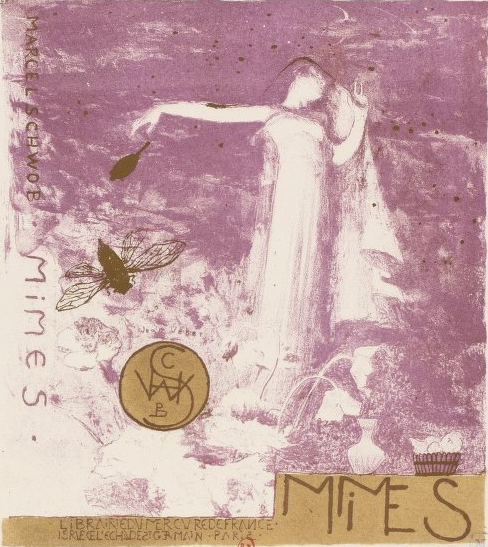
Sam Gordon and Katie Assef with two very different translations of one of Schwob’s most captivating pieces.
Read all previous posts in Asymptote’s “Mimes” translation project here.
Mime XVIII. Hermes the Psychagôgos
(trans. Sam Gordon)
I conduct the dead, whether they be shut up in sculpted stone sarcophagi or contained in the bellies of metal or clay urns, bedecked or gilded, or painted in blue, or eviscerated and without brains, or wrapped in strips of linen, and with my herald’s staff I guide their step as I usher them on.
We continue along a rapid way men cannot see. Courtesans press against virgins and murderers against philosophers, and mothers against those who refused to give birth, and priests against perjurers. For they are seeking forgiveness for their crimes, whether they imagined them in their heads, or committed them with their hands. And having not been free in life, bound as they were by laws and customs, or by their own memory, they fear isolation and lend one another support. She who slept naked amongst men in flagstoned chambers consoles a young girl who died before her wedding, and who dreams determinedly of love. One who used to kill at the roadside—face sullied with ash and soot—places a hand on the brow of a thinker who wanted to renew the world, who foretold death. The woman who loved her children and suffered by them hides her head in the breast of a Hetaira who was willfully sterile. The man draped in a long robe who had convinced himself to believe in his god, forcing himself down on bended knee, weeps on the shoulder of the cynic who had broken the oaths of the flesh and mind before the eyes of the citizens. In this way, they help each other throughout their journey, walking beneath the yoke of memory.

